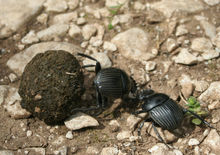On-going agricultural research supports what many savvy horse owners have known for years: dung beetles play a remarkable role in agriculture. By burying and consuming dung, they improve nutrient recycling and soil structure. They also protect horses by removing the dung which, if left, could provide habitat for pests such as flies.

Dung beetles fighting over a clump of manure
Research supports what many savvy horse owners have known for years, that by burying and consuming horse manure, dung beetles improve nutrient recycling and soil structure in pastures as well as getting rid of the manure.
© 2015 by Rafael Brix
Adult beetles feed on the juices in dung and then bury it underground, taking infective stages of gut parasites and fly larvae with it. Shredded dung remnants remain on the surface in which little can survive.
The females lay eggs in the buried dung and these hatch into larvae which eat the dung and grow into adult beetles.
Allowing dung beetles to bury dung in paddocks is a natural way to get rid of the dung and encourage the grass grow.
Beetle activity provides a number of obvious benefits:
- Improves soil health by burying nutrients and organic matter
- Prevents dung from smothering pasture
- Promotes pasture growth
- Helps to control parasitic gut worms and other pests
- Improves soil biology (earthworms and microbes)
- Increases soil carbon and organic matter
- Restructures the soil profile with tunnels and subsoil brought to the surface
-
Helps with biological control of the infective stages of gut worms and dung-breeding flies
Why could dung beetles be scarce on your horse property?
Many horse properties appear to have low numbers of dung beetles with correspondingly low levels of dung burial. This can be due to a lull in the seasonal activity of dung beetles such as in spring and autumn, but there can be a number of other causes, which include:
-
Use of beetle-toxic pastes/drenches
-
Frequent collection of all manure, denying the beetles the opportunity to breed locally
- Relatively unfavorable conditions for local breeding of established species
-
Dung beetle predators
Because of research indicating the many positive effects of dung beetles in livestock pastures, countries such as New Zealand, Brazil and Great Britain are being pro-active in promoting pasture practices that ensure a healthy population of dung beetles. It has been suggested that dung beetles save the US cattle industry over $380 million per year as a result of their ridding pastures and corrals of manure which creates both health and ecological problems.
Horse owners will do well to ensure that pastures are dung beetle friendly. Doing so, will benefit both horses and pastures.
